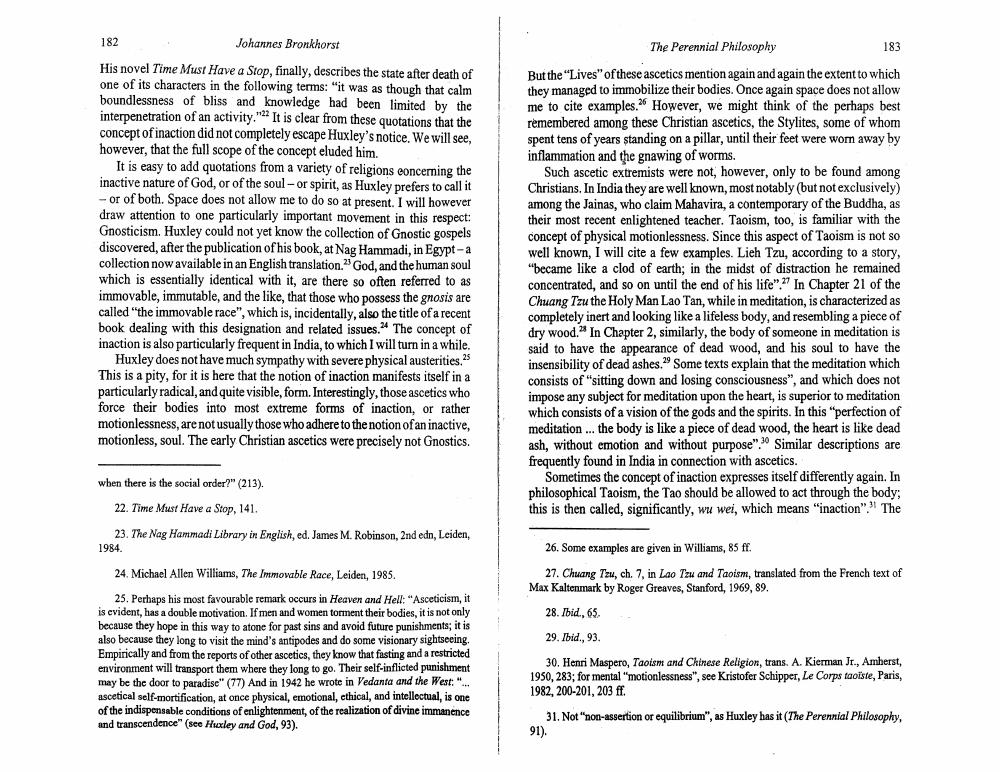Book Title: Perennial Philosophy And Law Of Karma Author(s): Johannes Bronkhorst Publisher: Johannes Bronkhorst View full book textPage 5
________________ 182 Johannes Bronkhorst The Perennial Philosophy 183 His novel Time Must Have a Stop, finally, describes the state after death of one of its characters in the following terms: "it was as though that calm boundlessness of bliss and knowledge had been limited by the interpenetration of an activity." It is clear from these quotations that the concept of inaction did not completely escape Huxley's notice. We will see, however, that the full scope of the concept eluded him. It is easy to add quotations from a variety of religions concerning the inactive nature of God, or of the soul - or spirit, as Huxley prefers to call it - or of both. Space does not allow me to do so at present. I will however draw attention to one particularly important movement in this respect: Gnosticism. Huxley could not yet know the collection of Gnostic gospels discovered, after the publication of his book, at Nag Hammadi, in Egypt -a collection now available in an English translation."God, and the human soul which is essentially identical with it, are there so often referred to as immovable, immutable, and the like, that those who possess the gnosis are called "the immovable race", which is incidentally, also the title of a recent book dealing with this designation and related issues. The concept of inaction is also particularly frequent in India, to which I will turn in a while. Huxley does not have much sympathy with severe physical austerities." This is a pity, for it is here that the notion of inaction manifests itself in a particularly radical, and quite visible, form. Interestingly, those ascetics who force their bodies into most extreme forms of inaction, or rather motionlessness, are not usually those who adhere to the notion of an inactive, motionless, soul. The early Christian ascetics were precisely not Gnostics. But the "Lives" of these ascetics mention again and again the extent to which they managed to immobilize their bodies. Once again space does not allow me to cite examples. However, we might think of the perhaps best remembered among these Christian ascetics, the Stylites, some of whom spent tens of years standing on a pillar, until their feet were wom away by inflammation and the gnawing of worms. Such ascetic extremists were not, however, only to be found among Christians, In India they are well known, most notably (but not exclusively) among the Jainas, who claim Mahavira, a contemporary of the Buddha, as their most recent enlightened teacher. Taoism, too, is familiar with the concept of physical motionlessness. Since this aspect of Taoism is not so well known, I will cite a few examples. Lieh Tzu, according to a story, "became like a clod of earth; in the midst of distraction he remained concentrated, and so on until the end of his life". In Chapter 21 of the Chuang Tzu the Holy Man Lao Tan, while in meditation, is characterized as completely inert and looking like a lifeless body, and resembling a piece of dry wood.In Chapter 2, similarly, the body of someone in meditation is said to have the appearance of dead wood, and his soul to have the insensibility of dead ashes." Some texts explain that the meditation which consists of "sitting down and losing consciousness", and which does not impose any subject for meditation upon the heart, is superior to meditation which consists of a vision of the gods and the spirits. In this "perfection of meditation ... the body is like a piece of dead wood, the heart is like dead ash, without emotion and without purpose". Similar descriptions are frequently found in India in connection with ascetics. Sometimes the concept of inaction expresses itself differently again. In philosophical Taoism, the Tao should be allowed to act through the body: this is then called, significantly, wu wei, which means "inaction". The when there is the social order?" (213). 22. Time Must Have a Stop, 141. 23. The Nag Hammadi Library in English, ed. James M. Robinson, 2nd edn, Leiden, 1984. 24. Michael Allen Williams, The Immovable Race, Leiden, 1985. 25. Perhaps his most favourable remark occurs in Heaven and Hell: "Asceticism, it is evident, has a double motivation. If men and women torment their bodies, it is not only because they hope in this way to atone for past sins and avoid future punishments, it is also because they long to visit the mind's antipodes and do some visionary sightseeing. Empirically and from the reports of other ascetics, they know that fasting and a restricted environment will transport them where they long to go. Their self-inflicted punishment may be the door to paradise" (77) And in 1942 he wrote in Vedanta and the West: "... ascetical self-mortification, at once physical, emotional, ethical, and intellectual, is one of the indispensable conditions of enlightenment of the realization of divine immanence and transcendence" (see Huxley and God, 93). 26. Some examples are given in Williams, 85 ff. 27. Chuang Tzu, ch. 7in Lao Tzu and Taoism, translated from the French text of Max Kaltenmark by Roger Greaves, Stanford, 1969, 89. 28. Ibid., 65. 29. Ibid., 93. 30. Henri Maspero, Taoism and Chinese Religion, trans. A. Kierman Jr., Amherst, 1950, 283; for mental "motionlessness", see Kristofer Schipper, Le Corps taoiste, Paris, 1982, 200-201, 203 ff. 31. Not "non-assertion or equilibrium", as Huxley has it (The Perennial Philosophy, 91).Page Navigation
1 ... 3 4 5 6 7 8
